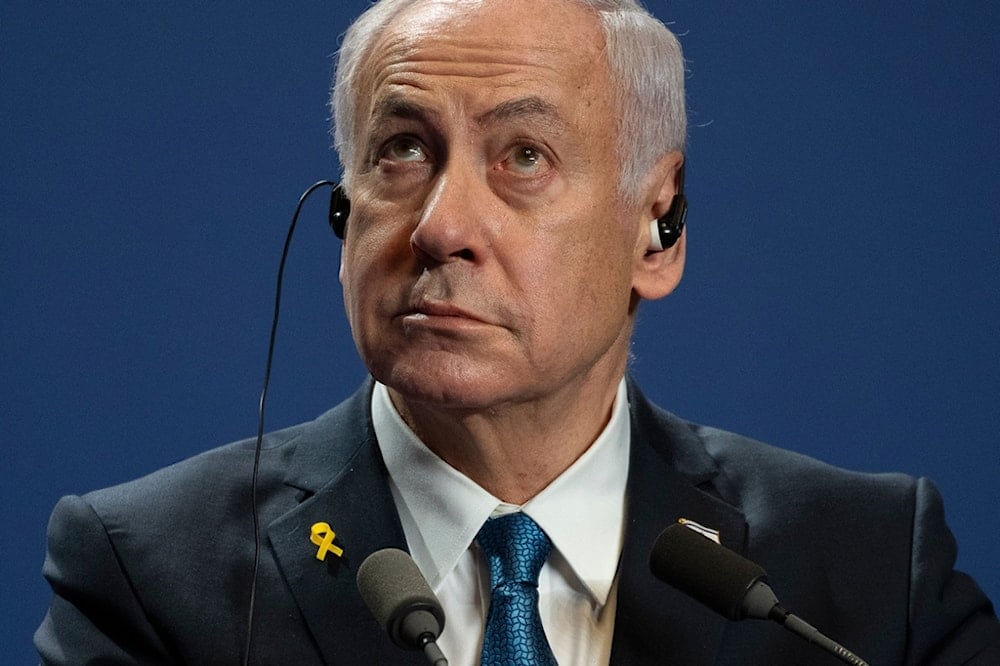Shin Bet chief says Netanyahu asked him to falsely testify in court
The former head of the Shin Bet, Ronen Bar, claims that Israeli Prime Minister Benjamin Netanyahu asked him to testify falsely in his court case.
-

Israeli Prime Minister Benjamin Netanyahu looks up during a press statement at the Carmelite Monastery in the Buda Castle in Budapest, Hungary, Thursday, April 3, 2025 (AP)
The head of the Israeli Shin Bet security service, Ronen Bar, has revealed that Prime Minister Benjamin Netanyahu pressured him to provide a false security opinion to the court in an attempt to delay his corruption trial.
When he refused, it marked the beginning of what Netanyahu later described as a "lack of trust" between them.
In a letter submitted to the court, the Shin Bet chief disclosed that at the start of Netanyahu’s trial on charges of bribery, fraud, and breach of trust, the prime minister requested that he issue a security assessment opposing the scheduling of court sessions three times a week.
After reviewing the matter, Bar determined there was no security reason to prevent the hearings from proceeding as planned.
Following this refusal, Netanyahu turned to the Israeli Home Front Command in search of a similar opinion but was again met with rejection.
Using security situation for cover
Regarding Netanyahu’s request, Bar said, "During November 2024, the Prime Minister repeatedly demanded that I provide a security opinion that would determine that security circumstances did not allow for his continuous testimony in his criminal trial."
"After conducting a process with all professional bodies and formulating a proper security envelope, I concluded that there was no security impediment to the testimony taking place in the prescribed format. This format was later presented to the court and approved," he said.
"I informed the Prime Minister of this. My refusal to accept his demands in this matter signaled the beginning of the claim that there was a 'lack of trust' between us, so to speak," he added.
Netanyahu was indicted in November 2019 on charges of bribery, fraud, and breach of trust.
Paramount corruption
In Case 4000, he provided regulatory benefits to an Israeli telecommunications mogul in exchange for favorable media coverage.
In Case 2000, he was accused of fraud and breach of trust over a deal with a newspaper publisher for similar media coverage.
In Case 1000, Netanyahu took $200,000 worth of cigars, champagne, and jewelry from businessmen in exchange for promoting their interests.
The trial, which began six months after his indictment, has been delayed due to Netanyahu's lawyers' tactics. Recently, they claimed that the prime minister could be targeted by a drone strike while testifying in public, forcing the judges to move the trial to a secure location in Tel Aviv.
Netanyahu's lawyers also claimed that he could not attend court three times a week due to the war on Gaza, and the judges made slight accommodations.
Weekly court hearings
Netanyahu attends court hearings twice a week to defend himself against charges of bribery, fraud, and breach of trust. According to Israeli media, he is scheduled to participate in a total of 24 sessions.
His trial, which began on May 24, 2020, marks the first time a sitting Israeli leader has taken the stand as a criminal defendant in the occupation entity's history.
Under Israeli law, Netanyahu is not obligated to step down unless convicted by the Supreme Court, a legal process that could take months.
In addition to the corruption charges, Netanyahu is also accused of war crimes and crimes against humanity. The International Criminal Court (ICC) issued arrest warrants for him and former Security Minister Yoav Gallant in November 2024 over atrocities in Gaza, where more than 50,400 people, mostly women and children, have been killed since October 7, 2023.

 4 Min Read
4 Min Read








